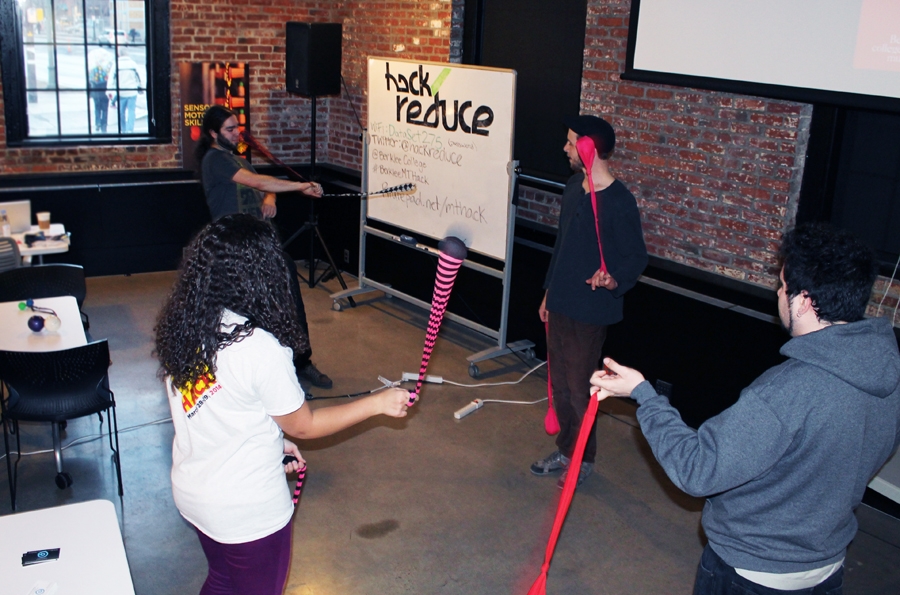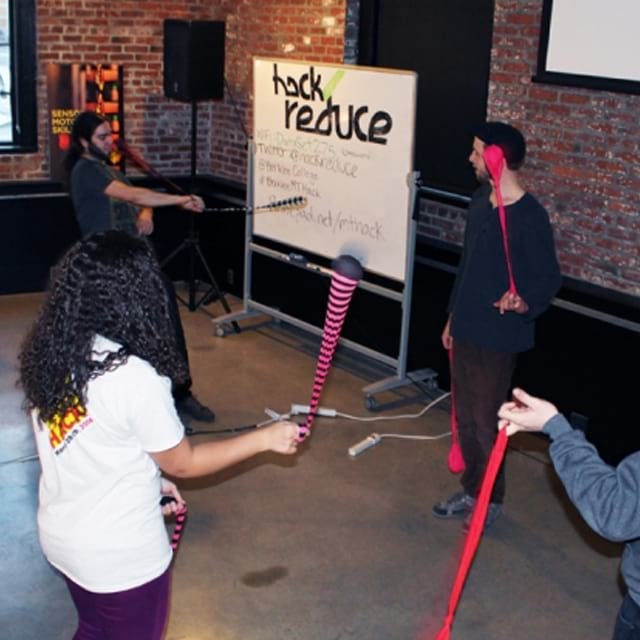The Hackathon (part 1)
As I peered into Hack/Reduce for the first time, I was transported back to my junior high lunch room. Where would I sit amongst the rows of long tables? What if no one wants to sit by me? What if no one likes the Orbitar? What if…I don’t want any of this free stuff ? I had hardly entered the room when a lady behind a table, wearing a Berklee College of Music hackathon t-shirt, was smothering me in hackathon merchandise. “Actually, I don’t really need any of that…” She looked dejected, and attempted to find a middle ground with “how about just the hackathon water bottle? It’s free!” I politely declined and made a bee line for the one lone table in the corner, while pondering my shattered preconceptions about what a hackathon would be like (the idea, and money behind, the merchandise felt completely absurd).
I made myself at home in the corner, unpacking my Orbitar stuffed backpack, and watching the crowd roll in, proudly sporting their hackathon t-shirts. There was an hour until the initial presentations began, and I started to anxiously obsess over the thought that during this hour, I was supposed to socialize with all of these strangers. Luckily at that moment collaborator Natan entered the scene, and I went from being the one weird loner kid in the corner, to being the one weird loner kid in the corner accompanied by another weird loner kid. And so I stayed there, until the presentations began.
Amidst many music therapy students asking for this and that, I got up and gave my Orbitar spiel, pleading that this thing flying around on a rope, without any actual research behind its potential therapeutic benefits, was what these music therapists should focus their energy on. The presentations were capped off by some motivational mumbo jumbo, annnnnnd we were off. Well, some people were off. Natan and I were more like, slowly thinking about approaching the starting line. We had no actual plans to compete in the hackathon, we just wanted to make some connections. “I’m gonna work on my live instrument manipulation patch” Natan decided and buried himself in his laptop. “Ok…I’m going to uh…walk around the room?” And so I found my introverted self in yet another Orbitar related social nightmare. I slowly paced up and down the rows of long tables filled with clusters of people already hard at work. Finding myself unable to approach any of them, I decided to just spin poi. And slowly, people looked up, and came over, and gave it a try. And soon the whole room was filled with socks spinning and flying.

And my hackathon team was formed: Natan, myself, and two music therapy students, who for some reason, decided to put their faith in those spinning socks. And we started brainstorming. About what types of populations poi spinning is applicable to. About what types of Orbitar patches would be useful to those populations. About our music therapy goals and the potential therapeutic benefits. We worked long into the night, fueled by a seemingly never ending supply of delicious dinner food, candy, and even a truck filled with cupcakes (when that truck pulled up I threw my skepticism about the hackathon budget out the window…A TRUCK FILLED WITH CUPCAKES!).

Around 11:00pm my team rolled out. And just as I was packing up, something even more anomalous than the cupcake truck transpired. All of the people tapping away at their computer keyboards, hunched over in heavy thought, got up, formed a circle, and started drumming. Much like the dinner food, a seemingly never ending supply of drums was flowing from some secret hallway. And it was the most musical, most orderly, most bizarre drum circle I have ever witnessed. After politely declining someone’s invitation to spin poi in the middle of the circle, I stood awkwardly on the edge, gave a shakaree a few shakes, and decided to head home and get some rest. Tomorrow, we were going to present our new Orbitar ideas to a panel of judges, in an attempt to win the grand $5,000 prize. And I felt like we just might win.

